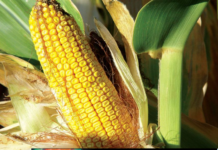Contact: Marsha Boswell, [email protected]
For audio version, visit kswheat.com.
The flurry of fall fieldwork season makes October a fitting month to recognize the cooperatives that help supply Kansas wheat producers with grain storage, marketing, field recommendations, inputs and patronage. Cooperatives have existed nearly as long as farmers have been farming as producers learned how to pool resources and expertise to support each other’s operations. National Co-op Month is a nationwide event that raises awareness of how cooperatives provide a tried-and-true way to do business and support resilient communities.
And while rural Kansans are familiar with the prairie skyscrapers that dot the horizon — iconic grain elevators with the town name often painted in bold, block letters — cooperatives are more than just a place to deliver and store grain. Today, these member-driven businesses can also provide credit, insurance, electric service, health care, housing, telephone services and even childcare. Cooperatives also help support more than row-crop agriculture, representing industries from grape juice to electricity.
“In Kansas, agricultural cooperatives are very grain marketing-based, but outside of Kansas that is not the case,” said Brandi Miller, president/CEO of the Kansas Cooperative Council, the organization that has represented the cooperative business model in the Sunflower State since 1944. “There are a lot of cooperatives focused on consumer products. People see their products on the shelves and don’t realize they function exactly like the co-op they see in their hometown.”
According to the Kansas Cooperative Council, Kansas is home to more than 575 co-op locations with more than 116,000 members and 5,000 employees. Those businesses support the health of local economies by creating jobs, paying property taxes and income taxes and giving to charity.
The weather-driven challenges of the past few growing seasons have made this payback difficult for cooperatives, just as it has been difficult for their farmer members. But, Miller reminds farmers that just as they are resolved to adapt in challenging times, so are the cooperatives of which they are members. Kansas cooperatives are working to explore options to do things differently or more efficiently to help provide better services to their members, investments that take time and money to implement, but match the innovation that takes place on Kansas farms.
To support awareness of how cooperatives function, the Kansas Cooperative Council developed a series of “Co-ops 101 Videos” for educational uses from employee or new board director onboarding to sharing about what cooperatives do with high school students or interns. The videos were developed through a grant with CHS, Inc. and in collaboration with Brian Briggeman, director of the Arthur Capper Cooperative Center in K-State’s Department of Agricultural Economics. They cover a variety of introductory topics, including the definition and function of a cooperative, the seven cooperative principles, patronage, allocated equity retirement, co-op governance, qualified versus non-qualified patronage distributions and how patronage distributions are determined.
Miller hopes the video series and other efforts during National Co-op Month encourage both farmers and others to learn more about the cooperatives in their communities. She also encourages all to explore how they can help make decisions and set a strategic path forward by serving on that cooperative’s board.
“I always encourage people to consider getting involved in their local cooperative,” Miller said. “Every co-op is looking for good people who want to see their communities flourish and utilize the cooperative to provide community resources. Check it out; it’s an important function in our rural communities.”
Learn more about Kansas cooperatives or check out the Co-ops 101 video series at https://www.kansasco-op.coop/.
###
Written by Julia Debes for Kansas Wheat




